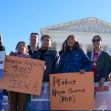The California legislature enacted an amendment to the Indian Child Welfare Act (ICWA) in 2018 that requires agencies like the Los Angeles County Department of Children and Family Services (DCFS) to ask not only parents but extended family members about the possible Native American ancestry of children who are placed for adoption. A recent decision by a Court of Appeal agreed that this law must be followed, but in one case, it decided that it was harmless error to ignore it.
In an unpublished February 2-1 decision by Division Eight of the Second Circuit Court of Appeal, Presiding Justice Maria Stratton acknowledged the law but said that since DCFS placed the child with a maternal step-grandmother, there was “no reason to know that the children may have Indian ancestry.” The placement order of Los Angeles Superior Court Judge Michael C. Kelly was affirmed. It should be noted that throughout the proceedings, all parties were referred to as Indians, not Native Americans.
Justice John Shepard Wiley filed a strong dissent, his 17th on the topic. He said he will keep dissenting until the California Supreme Court’s decision to ask extended family members, not just parents, if a child has Native American heritage is followed. Wiley said the court had a statutory duty to provide tribes with “better information” in order to “better serve the children and preserve their cultures.”
The case began when a mother, identified as T.C., lost custody of her children in October 2018. She had “brandished a gun” in the presence of her three children a month earlier, and had broken a window. DCFS then filed a petition fearing the children were at risk of abuse or neglect. The petition also explained that the mother’s repeated marijuana usage stemmed from childhood trauma. It claimed that her background and behavior prevented her from being able to care for her kids. An amended petition added that she had “emotional issues” that caused “assaultive behavior and anger management issues.”
The trial court struck the gun incident but found the substance abuse and childhood trauma issues persuasive reasons to remove her nine-year-old son and seven-year-old twin girls from the mother.
The judge ordered DCFS to locate “suitable placement” and to consider reunification with the mother. As new allegations about the mother were made in November 2021, the mother’s parental rights were terminated and the children were found to be “adoptable.” The children’s maternal step-grandmother was designated as a “prospective adoptive parent.”
At the detention hearing in September 2018, the mother had checked a box on a form required under the 1978 federal Indian Child Welfare Act (ICWA). The box stated, “I may have Indian ancestry.” She told the court that her grandmother was “mixed with Indian,” but neither she nor two relatives in attendance could provide any information to verify this ancestry. The court therefore decided that the ICWA did not apply to her. She also confirmed that she had no Indian relatives on two separate dates. When other relatives were identified, DCFS failed to ask any of them if they had Indian ancestry.
T.C. appealed the Juvenile Court’s decision to terminate her parental rights. Her appeal was based on the fact that DCFS failed to follow the section of the State’s Welfare and Institutions Code that requires that “maternal extended family members be asked about Indian ancestry.”
Stratton’s discussion began with a review of the ICWA. She explained that Congress passed the Act after finding that “an alarmingly high percentage of Indian families are broken up by the removal, often unwarranted, of their children from them by nontribal public and private agencies” and that a similarly high percentage are placed in non-Indian homes, foster homes, or institutions. ICWA further explained that the law was in the “best interests of Indian children” while promoting the “stability and security of Indian tribes and families.”
The opinion also referenced a U.S. Supreme Court case that acknowledged the importance of the ICWA in response to the separation of Indian children and their parents due to “abusive child welfare practices.” California mandated that ICWA be followed in all the State’s child custody cases. Language in the law relied on by T.C. says that the DCFS is “obligated” to ask “the child, parents, legal guardians, Indian custodian, extended family members, and others…whether the child is, or may be, an Indian child.” DCFS, said Stratton, “did not fulfill its duties.”
But was the error harmless or prejudicial? Stratton ruled the former, saying, “We find no miscarriage of justice.” The ruling was based on the fact that the children’s maternal step-grandmother was to be their “prospective adopted parent.” She had a long relationship with the children, who “appear to be thriving.” Stratton said that the statute, while not specifically naming step-grandparents, would include them. Even T.C. found no problem with the proposed adoption. “The abuses ICWA was enacted to prevent are not in play here,” the opinion emphasized. There was thus “no miscarriage of justice.”
But Justice Wiley did not agree. In his dissent, he wrote, “The miscarriage of justice is cutting tribes out of the child placement process.” He said the legislation requires agencies to ask extended family members about the possible Indian ancestry of children who need placement. He did not think that questioning only the parents would address the serious problem that tribes identified because parents could have incomplete information.
He then referenced the Tribal Report that led to the California legislature’s 2018 that added the requirement of asking extended family members (italics in original) about possible Indian ancestry. He stressed that a “tribe’s rights are independent of the rights of other parties,” and concluded that “the injustice inherent in tribes not being fairly included in state court can be overcome only by ensuring tribal participation,” and ended his dissent by stating how it is his 17th similar dissent on this topic. “The Department could eliminate this issue by complying with the 2018 amendment,” he concluded.






